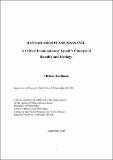Hannah Arendt and mass evil: A critical examination of Arendt's concepts of banality and Ideology

View/
Date
2020-02-27Author
Hardiman, Michael
Metadata
Show full item recordUsage
This item's downloads: 149 (view details)
Abstract
ABSTRACT
This thesis explicates Hannah Arendt’s understanding of mass evildoing. Arendt’s approach to mass evil is grounded in her analysis of the historical periods of the Third Reich and the Soviet regime under Stalin as well as the Eichmann trial in Jerusalem. Those events gave Arendt the material to hypothesise that a new form of evil had entered the world. This form of evil, she termed ‘radical evil’ and is distinguished from what can be termed ‘normal criminality’. It is a form of evil that is produced by a fusion of widespread banality in a society, and an ideology that legitimises evildoing. This form of evil bypasses or defeats the normal preventative obstacles of individual morality.
The basic concepts developed by Arendt to explain ‘radical evil’ are presented. In addition, certain elements that constitute banality, as referenced by Arendt in the phrase the ‘banality of evil’ are identified and examined. As a consequence, the thesis proposes a conceptual triangle inherent in banal evil-doing that comprises three elements: (i) Thoughtlessness (ii) Obedience and (iii) Immersion. These are identified as central aspects that constitute banality as discovered by Arendt in her study of Eichmann. In addition, the form of ideology that leads to radical evil is also discussed. This form of ideology, one that is most germane to the spread of mass evil is identified and titled ‘pernicious ideology’. This is explored in some detail, as well as the distinction between this form of ideology and others that are less potentially dangerous. Having disclosed the central conceptual elements in Arendt’s understanding of both banality and ideology the thesis provides empirical evidence from the fields of historical analysis, psychology, and sociology to support the validity of these concepts.
The third strand of this thesis proposes that banality is not limited to the historical period assessed by Arendt, but is an intrinsic part of modern advanced societies. In addition the need for ideology is also identified as fundamental to such societies. It is concluded then that the constituents for mass evil-doing remain dormant in all advanced societies and can be awakened when certain political/economic circumstances take hold.
More specifically, it is argued that radical evil, as a product of banality and ideology, results from a widespread failure among substantial numbers in society to develop a firm sense of individuality, a personally well thought out moral code, and the cultivation of moral courage. Certain suggestions as to the forms of interventions whereby such danger can be identified is discussed in terms of providing people with better capabilities to withstand radical evil, by learning to avoid banality, and to recognise and resist ideological conditioning.

